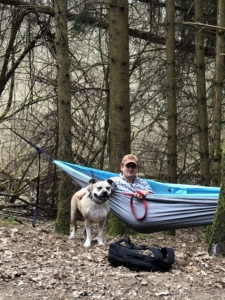Warrior Spotlight: U.S. Army First Sergeant Alex Brownstein
 U.S. Army First Sergeant Alex Brownstein says serving in the military has been the most meaningful thing he’s done in his life. We met him through Warrior Canine Connection’s Mission Based Trauma Recovery (MBTR) training program in partnership with Wounded Warrior Project (WWP). We are honored to share his Warrior story.
U.S. Army First Sergeant Alex Brownstein says serving in the military has been the most meaningful thing he’s done in his life. We met him through Warrior Canine Connection’s Mission Based Trauma Recovery (MBTR) training program in partnership with Wounded Warrior Project (WWP). We are honored to share his Warrior story.
“First and foremost, for me, service to others is a very big thing, it’s kind of what has guided me for the past 18 years, different trials, different tribulations,” said Brownstein. “I frame it as if what I am doing benefits others, not just myself, I am doing something right. It’s been so impactful and has also afforded me the opportunity to see the world, have new experiences, and tackle some challenging assignments.”
Brownstein has endured several challenging assignments over the course of the past 18 years, including three deployments in Iraq and Afghanistan. It was during one of his tours in Afghanistan that he sustained a traumatic brain injury due to exposure to an improvised explosive device (IED).
It was shortly after that when a physician told Brownstein about WWP and its programming that many Veterans with traumatic brain injury (TBI) benefit from. Brownstein enjoyed several events, including trivia nights, virtual events, and other outdoor activities.
It was at one WWP event that he discovered WCC and its MBTR training program. Essentially, Service Member and Veteran participants help train service dogs for fellow Warriors over the course of eight weeks. Through the training, Veterans help their comrades in arms, they can also benefit from therapeutic aspects of the program including increased impulse control, sleep and emotional regulation, as well as decreased stress levels, depression and hypervigilance.
“I loved it, absolutely loved it,” said Brownstein. “I’m not a very social person, so it allowed me to interact and integrate with a group of Veterans and volunteers through WCC in an environment where there was no pressure, no stress, you were there to help with the dogs and participate in a program that will help Veterans in need. I felt very strongly connected to it — it had the added benefit of showing me another way to decrease my own levels of stress and provided me with purpose outside of my military career.”
Now stationed at Fort Meade in Maryland, Brownstein works as an organizational leader, helping to take care of other soldiers. In fact, he also recently arranged to have his team visit WCC to learn more about the program and interact with the dogs.
“It reinforced the incredible bond that can be had between a human and a dog,” said Brownstein. “Some of the bonds I’ve had in the military are the strongest I’ll ever have, and I found a lot of similarities with the dogs.”
To learn more about WWP’s programs, visit www.woundedwarriorproject.org. For more information about WCC’s MBTR program, visit www.warriorcanineconnection.org.
# # #



Leave a Reply
Want to join the discussion?Feel free to contribute!